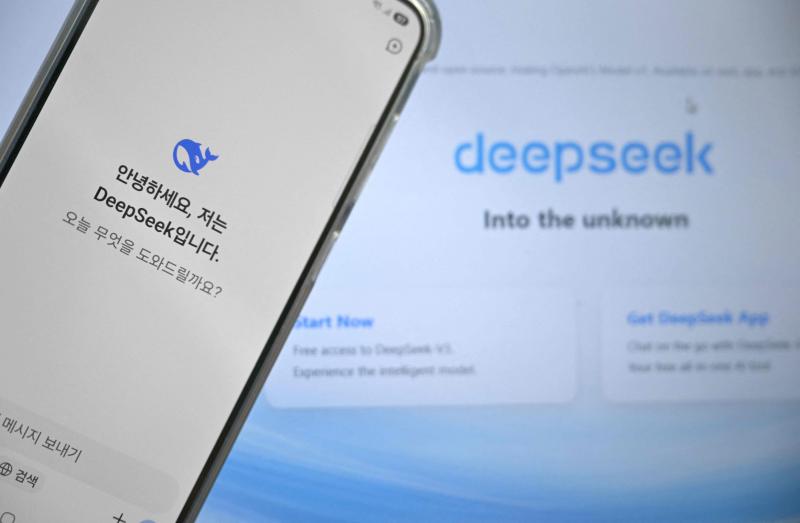Chinese artificial intelligence (AI) app DeepSeek would not be available to download in South Korea pending a review of its handling of user data, Seoul authorities said today.
DeepSeek's R1 chatbot stunned investors and industry insiders with its ability to match the functions of its Western competitors at a fraction of the cost.

Photo: AFP
However, a number of countries have questioned DeepSeek's storage of user data, which the firm says is collected in "secure servers located in the People's Republic of China."
Seoul's Personal Information Protection Commission said today that DeepSeek would no longer be available for download until a review of its personal data collection practices was carried out.
The Chinese AI firm has "acknowledged that considerations for domestic privacy laws were somewhat lacking," the data protection agency said.
It assessed that bringing the app into line with local privacy laws "would inevitably take a significant amount of time," the agency added.
"To prevent further concerns from spreading, the commission recommended that DeepSeek temporarily suspend its service while making the necessary improvements," it said.
DeepSeek has "accepted" that proposal.
The app was removed from local app stores on Saturday at 6pm and remains unavailable.
The AI chatbot is still in use for those who have already downloaded the app.
Seoul's data protection agency said it "strongly advised" people to "use the service with caution until the final results are announced."
That included "refraining from entering personal information into the DeepSeek input field," it said.
Analyst Youm Heung-youl said that the firm was yet to lay out a privacy policy "specifically tailored" for users in South Korea.
"It has on the other hand disclosed a privacy policy for the EU and certain other countries, stating that it complies with the domestic laws of those nations," said Youm, a data security professor at Soonchunhyang University.
"Deepseek needs to establish a privacy policy specific to Korea," he said.
This month, a slew of South Korean government ministries and police said they blocked access to DeepSeek on their computers.
Italy has also launched an investigation into DeepSeek's R1 model and blocked it from processing Italian users' data.
Australia has banned DeepSeek from all government devices on the advice of security agencies.
US lawmakers have also proposed a bill to ban DeepSeek from being used on government devices over concerns about user data security.
In response to the bans, the Chinese government has said it opposes the "politicization of economic, trade and technological issues."
It also insists it "has never and will never require enterprises or individuals to illegally collect or store data."

Asian perspectives of the US have shifted from a country once perceived as a force of “moral legitimacy” to something akin to “a landlord seeking rent,” Singaporean Minister for Defence Ng Eng Hen (黃永宏) said on the sidelines of an international security meeting. Ng said in a round-table discussion at the Munich Security Conference in Germany that assumptions undertaken in the years after the end of World War II have fundamentally changed. One example is that from the time of former US president John F. Kennedy’s inaugural address more than 60 years ago, the image of the US was of a country

BLIND COST CUTTING: A DOGE push to lay off 2,000 energy department workers resulted in hundreds of staff at a nuclear security agency being fired — then ‘unfired’ US President Donald Trump’s administration has halted the firings of hundreds of federal employees who were tasked with working on the nation’s nuclear weapons programs, in an about-face that has left workers confused and experts cautioning that the Department of Government Efficiency’s (DOGE’s) blind cost cutting would put communities at risk. Three US officials who spoke to The Associated Press said up to 350 employees at the National Nuclear Security Administration (NNSA) were abruptly laid off late on Thursday, with some losing access to e-mail before they’d learned they were fired, only to try to enter their offices on Friday morning

Cook Islands officials yesterday said they had discussed seabed minerals research with China as the small Pacific island mulls deep-sea mining of its waters. The self-governing country of 17,000 people — a former colony of close partner New Zealand — has licensed three companies to explore the seabed for nodules rich in metals such as nickel and cobalt, which are used in electric vehicle (EV) batteries. Despite issuing the five-year exploration licenses in 2022, the Cook Islands government said it would not decide whether to harvest the potato-sized nodules until it has assessed environmental and other impacts. Cook Islands Prime Minister Mark Brown

STEADFAST DART: The six-week exercise, which involves about 10,000 troops from nine nations, focuses on rapid deployment scenarios and multidomain operations NATO is testing its ability to rapidly deploy across eastern Europe — without direct US assistance — as Washington shifts its approach toward European defense and the war in Ukraine. The six-week Steadfast Dart 2025 exercises across Bulgaria, Romania and Greece are taking place as Russia’s invasion of Ukraine approaches the three-year mark. They involve about 10,000 troops from nine nations and represent the largest NATO operation planned this year. The US absence from the exercises comes as European nations scramble to build greater military self-sufficiency over their concerns about the commitment of US President Donald Trump’s administration to common defense and